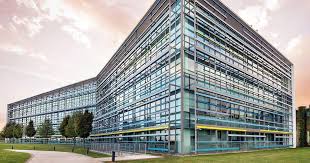In the world of architecture and construction, design and functionality are equally important. For commercial properties, creating spaces that are both visually appealing and practical is a key goal. One material that has gained traction for meeting these demands is artificial glass. Often regarded as a versatile and durable alternative to traditional glass, artificial glass offers a range of benefits for commercial properties, from enhancing aesthetic appeal to improving energy efficiency.
In this article, we will explore what artificial glass is, its uses in commercial properties, and how it can benefit businesses in terms of design, sustainability, and cost-effectiveness.
What is Artificial Glass?
Artificial glass, also known as synthetic glass or engineered glass, is a man-made material that mimics the properties of traditional glass but with additional benefits. Unlike natural glass, which is primarily composed of silica, artificial glass is typically made using polymers, resins, and various composite materials. The goal of artificial glass is to provide a durable, lightweight, and customizable alternative that can replicate the clarity and aesthetic appeal of traditional glass.
There are different types of artificial glass products, including acrylic, polycarbonate, and fiberglass, each offering unique advantages depending on the needs of the commercial property. These materials often have a similar look and feel to glass but tend to be more flexible, shatter-resistant, and cost-effective.
Benefits of Artificial Glass for Commercial Properties
- Enhanced Durability and Safety One of the standout benefits of artificial glass for commercial properties is its durability. Traditional glass can be prone to breaking or shattering, especially in high-traffic areas or buildings subject to harsh weather conditions. In contrast, artificial glass materials such as acrylic and polycarbonate are highly impact-resistant, making them a safer option in commercial settings. This feature reduces the risk of accidents and injuries, a crucial consideration in buildings with a lot of foot traffic, such as shopping malls, office buildings, and airports.
- Cost-Effectiveness Traditional glass can be expensive, not only in terms of material cost but also installation and maintenance. Artificial glass is often more affordable, providing a budget-friendly alternative for architects and property owners. Additionally, since artificial glass is generally easier to install and
Artificial Glass for Commercial Properties
requires less maintenance than traditional glass, it can lead to long-term cost savings. Its durability means less frequent repairs or replacements, helping businesses save on upkeep costs.
- Energy Efficiency Commercial properties often face the challenge of managing energy consumption, particularly with regard to heating and cooling. Artificial glass materials, such as polycarbonate, can offer better insulation properties than traditional glass. These materials help regulate temperature by reducing heat transfer, keeping buildings cooler in the summer and warmer in the winter. This energy efficiency can lead to reduced utility costs and a more sustainable building operation, which is especially important for companies focused on green building practices or aiming for certifications like LEED (Leadership in Energy and Environmental Design).
- Design Flexibility Artificial glass offers a great deal of design flexibility, which is a key benefit for architects working on commercial properties. Unlike traditional glass, artificial glass can be molded into various shapes, colors, and textures. This makes it ideal for unique design elements, such as curved windows, decorative panels, or custom glass partitions. It also comes in a variety of finishes, from clear to frosted or tinted, allowing architects to create a wide range of aesthetic effects to suit the branding and style of a commercial space.
- Lightweight and Easy to Handle Artificial glass is much lighter than traditional glass, making it easier to handle during installation. This is especially important for large commercial properties, where heavy glass panels can be difficult to transport and install. The lighter weight of artificial glass reduces labor costs and can speed up the construction or renovation process. Additionally, the reduced weight places less stress on the building’s structural components, which can be beneficial for both the building’s design and long-term durability.
- UV Protection Many artificial glass products, such as polycarbonate, offer UV protection. In commercial spaces with large windows or skylights, UV rays can cause damage to furniture, flooring, and artwork. By incorporating artificial glass that blocks harmful UV rays, businesses can protect their interior spaces from fading or deterioration. This can help preserve the aesthetics of a commercial property and reduce the need for frequent replacements of furnishings or finishes.
